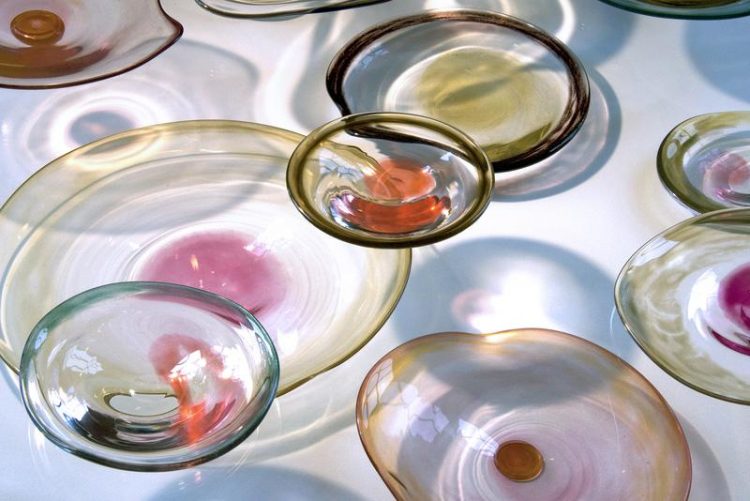“Lens on Life” – Artists and Scientists Explore Cell Divison

The pictures show “Zona pellucida”, mouth blown glass by Rob Kesseler that will feature in the exhibition. Copyright: Rob Kesseler
Lens On Life is curated by Marina Wallace, Professor at the Central Saint Martins College of Art & Design in London and Director of Artakt. The exhibition is aimed at disseminating the scientific knowledge acquired during the five years of MitoSys (2010-2015), an integrated project realised with the support of the European Union under its Seventh Framework Program (FP7). MitoSys is coordinated by Jan-Michael Peters at the Institute of Molecular Pathology in Vienna.
“I wanted to address the question to which extent artists and scientists are driven by the same motivation – a deeply rooted desire to understand and to describe the world around us”, says Jan-Michael Peters. “My guess is that they share many key attributes, like creativity and curiosity.”
Internationally leading biologists, mathematicians, biochemists and biophysicists working at thirteen research institutes including the Department of Biochemistry in Oxford, the MRC Laboratory of Molecular Biology in Cambridge and the Max Planck Institute for the Physics of Complex Systems in Dresden, have collaborated to reveal how genes and proteins orchestrate mitosis in human cells.
The exhibition emerges from a dialogue, established between artists and scientists, concerning one of the fundamental mechanisms of human life – mitosis. Lens On life is a project strongly rooted within the field of art and science. It offers a novel take on mitosis and human cell division through historical and contemporary references and an imaginative interpretation by the artists involved.
Artists Lucy + Jorge Orta, Rob Kesseler, Ackroyd & Harvey and choreographer Shobana Jeyasingh met with scientists from the MitoSys consortium –Tony Hyman, Melina Schuh, Jan-Michael Peters and Kim Nasmyth. Through visits to the scientific laboratories and the artists’ studios, artists and scientists established a common territory, made of images and metaphors, developing an open and enduring dialogue.
The works exhibited are the tangible result of these meetings and constitute a re-elaboration and experimentation aimed at providing a new perspective upon the processes of mitosis and meiosis. An important part of the exhibition is the documentary, Meetings of Minds, witnessing the various stages of the collaboration between artists and scientists.
The exhibition in Rome (Federica Schiavo Gallery) is the first of a series of three. After Rome, Lens On Life will travel to London from 29 January to 28 February 2015 (Lethaby Gallery, Central Saint Martins) and will end in Heidelberg (University Museum) from 16 March to 28 April 2015. The documentary Meetings of Minds will be screened in Vienna (University of Music and Performing Arts) in April 2015.
About MitoSys
MitoSys (Systems Biology of Mitosis) started in June 2010 and will last until 2015. Its aim is to tackle mitosis from a systems biology perspective. Leading biologists, mathematicians, biochemists and biophysicists working at thirteen research institutes, universities, international organizations and companies in eight European countries collaborate to reveal how genes and proteins orchestrate mitosis in human cells. MitoSys will receive ten million Euros from the European Union under its seventh framework programme (FP7).
About Jan-Michael Peters
Jan-Michael Peters was born in Germany in 1962. He studied Biology in Kiel and Heidelberg and in 1991 obtained his PhD in Cell Biology. Peters joined the IMP in 1996 and in 2013 became its Scientific Director. He has received a number of awards for his research on cell division, including the EMBO Young Investigator Award, the Novartis Research Prize and the Wittgenstein Award of the Austrian Government.
About the IMP
The Research Institute of Molecular Pathology (IMP) in Vienna is a basic biomedical research institute largely sponsored by Boehringer Ingelheim. With over 200 scientists from 35 nations, the IMP is committed to scientific discovery of fundamental molecular and cellular mechanisms underlying complex biological phenomena. Research areas include cell and molecular biology, neurobiology, disease mechanisms and computational biology.
Contact
Dr. Heidemarie Hurtl
IMP Communications
Phone: +43 1 79730 3625
E-mail: hurtl@imp.ac.at
http://www.mitosys.org
http://www.imp.ac.at/research/research-groups/peters-group/
Media Contact
All latest news from the category: Event News
Newest articles

Magnetic Effect: Groundbreaking Discovery for Low-Temperature Thermoelectric Cooling
Researchers at the Max Planck Institute for Chemical Physics of Solids, in collaboration with Chongqing University and the Max Planck Institute of Microstructure Physics, have achieved a breakthrough in topological…

Parallel Paths: Understanding Malaria Resistance in Chimpanzees and Humans
The closest relatives of humans adapt genetically to habitats and infections Survival of the Fittest: Genetic Adaptations Uncovered in Chimpanzees Görlitz, 10.01.2025. Chimpanzees have genetic adaptations that help them survive…

You are What You Eat—Stanford Study Links Fiber to Anti-Cancer Gene Modulation
The Fiber Gap: A Growing Concern in American Diets Fiber is well known to be an important part of a healthy diet, yet less than 10% of Americans eat the minimum recommended…



